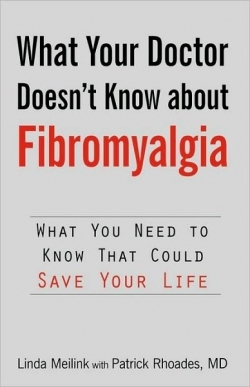What Your Doctor Doesn't Know about Fibromyalgia
What You Need to Know That Could Save Your Life
Chronic pain, in all its debilitating manifestations, is a central theme of reporter Linda Meilink’s superb book about her decade spent learning about fibromyalgia (FMS) through her own tragic acquisition of the disease. Her thoroughly researched (and personally experienced) insights into a disease that is too often misunderstood and misdiagnosed are balanced and tear-jerking honesty. There were times, she confessed, when her unrelenting pain flared to such a degree that she contemplated suicide. A good day was a six on a scale of ten. For ten agonizing years, Meilink’s determined and sometimes desperate quest to find relief for the pain and other unpredictable manifestations of FMS consumed her days and sleepless nights.
Because of a number of factors, including the frustrating complexity of FMS, the dependence on the advice of former cheerleaders turned pharmaceutical saleswomen, and the fear of losing their license, most doctors preferred to prescribe antidepressants for pain and other symptoms unrelated to depression. A narcotic painkiller or a Valium-like drug would have been a healthier, safer, and saner choice. Antidepressants, Meilink learned, do little for chronic pain, almost always causing physical dependence, a ubiquity of debilitating side effects and life-threatening withdrawal symptoms.
Meilink recounts with humor and poignancy her hopeful forays into several alternative treatments from acupuncture, which helped, to expensive supplements, which didn’t help. She shares an endless stream of tragicomic consultations with doctors who mostly just wanted her to go away, accused her of exaggerating, gave her inane and condescending advice, and wrote prescriptions for drugs that made her worse. Some of her doctors were wonderful, though, and one pain specialist, Dr. Patrick Rhoades, contributed to What Your Doctor Doesn’t Know about Fibromyalgia.
Meilink reaches out to others who have or think they have FMS with an impassioned empathy that is palpable. She tells them not to give up their search for a doctor who is compassionate and takes them seriously. Though she has a love-hate relationship with the overused and guilt-inducing idea of “keeping a positive attitude,” she extols its importance in training oneself to never give up.
Serendipitously, Meilink recently learned that her decades of insomnia stemmed from a serious case of sleep apnea that had been exacerbating her FMS symptoms. This diagnosis and the subsequent treatment to alleviate the sleep apnea gave her a new lease on life in a myriad of ways. Though not quite ready to return to work (a fascinating sub-theme of the book relating her often self-destructive struggle to continue working), Meilink’s pain level decreased significantly, and many of her other unpleasant symptoms were more manageable.
What Your Doctor Doesn’t Know about Fibromyalgia is absolutely a must-read for everyone who has had FMS, thinks they might have FMS, has a loved one with FMS, or has an MD after their name. It’s that good.
Reviewed by
Patty Sutherland
Disclosure: This article is not an endorsement, but a review. The publisher of this book provided free copies of the book and paid a small fee to have their book reviewed by a professional reviewer. Foreword Reviews and Clarion Reviews make no guarantee that the publisher will receive a positive review. Foreword Magazine, Inc. is disclosing this in accordance with the Federal Trade Commission’s 16 CFR, Part 255.

